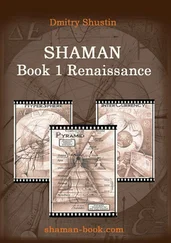‘I don’t know about you, but I’ve got children. They’ll remember me all right… The oldest, at least,’ Ahmed added gravely after pondering for a moment.
Homer was stung by that, and felt he should make a sharp retort, but Ahmed’s final words had blunted his battle fervour. It was true: it was easy enough for an old man like him, with no children, to risk his moth-eaten skin, but the young man still had a long life ahead of him – too long to be concerned about immortality.
They moved beyond the final lamp – a glass jar with a little electric bulb inside it, set in a frame of thin metal rods. It was full of singed flies and flying cockroaches. The chitinous mass was heaving slightly: some of the insects were still alive and trying to crawl out, like condemned prisoners who had fallen into the common trench with everyone else who was shot, but hadn’t been finished off.
Homer paused involuntarily for an instant in the spot of light that this lamp-grave wrung out of itself – weak and yellow, flickering on the point of extinction. Then he filled his lungs with air and plunged on after the others into the ink-black gloom that extended from the boundary of Sebastopol all the way to the approaches to Tula – if, of course, any station with that name still existed.
She wasn’t alone, that sombre woman with two little children, standing rooted to the granite slabs, the platform wasn’t entirely deserted. A fat man with one eye and wrestler’s shoulders was standing motionless some distance away, watching as the soldiers left, and one step behind him stood a sinewy old man in a private’s pea jacket, talking quietly to an orderly.
‘All we can do now is wait,’ Istomin declared, absentmindedly switching a dead cigarette end from one corner of his mouth to the other.
‘You wait, I’ll get on with my job,’ the colonel retorted obstinately.
‘I tell you, that was Andrei. The leader of the team we sent out,’ said Istomin. He listened once again to the telephone-receiver voice still clamouring insistently in his head.
‘So now what? Maybe they forced him to say that under torture. The specialists know all sorts of different methods,’ said the old man, raising one eyebrow.
‘It didn’t seem like that,’ said the commandant, shaking his head thoughtfully. ‘You should have heard the way he said it. There’s something else going on there, something inexplicable. Something we can’t fix with a brisk cavalry sortie…’
‘I’ll give you an explanation as quick as a wink,’ the colonel assured him. ‘Tula’s been captured by bandits. They set up an ambush and killed our men or took some as hostages. They don’t cut off the power, because they use it themselves, and they don’t want to get on the wrong side of Hansa. But they cut off the phone. What weird sort of business is that – a phone that sometimes works and sometimes doesn’t?’
‘But his voice, the way it sounded…’ said Istomin, sticking to his point.
‘What way did it sound?’ the colonel exploded, making the orderly move back a few steps. ‘Stick pins under your nails, and we’ll see what your voice sounds like! And with a simple pair of pliers you can change a bass to a falsetto for the rest of a man’s life!’
Everything was already clear to him, he had made his choice. And having resolved all his doubts, he felt as if he were back on his steed, and his cavalryman’s hand was itching for the sabre, no matter how dismally Istomin might whinge.
The commandant took his time before answering, giving the colonel a chance to cool off.
‘We’ll wait,’ he said at last, amicably but firmly.
‘Two days,’ said the old man, crossing his arms.
‘Two days,’ said Istomin, nodding.
The colonel spun round on the spot and tramped off to the barracks: he wasn’t going to waste the precious hours ahead. The commanders of the assault units had been waiting for him at HQ for the best part of an hour, lined up along both flanks of the long planking table. The only empty chairs were at the opposite ends: his and Istomin’s. But this time they would have to start without the commandant.
The station commandant didn’t notice that Denis Mikhailovich had gone.
‘It’s amusing, the way our roles have switched over, isn’t it?’ said Istomin, perhaps talking to himself, perhaps to the colonel.
Swinging round without waiting for a reply, he encountered the orderly’s embarrassed glance and waved his arm to dismiss him. ‘I don’t recognise the same colonel who refused to let me have a single extra man,’ the commandant thought. ‘The old war dog has scented something. But is that nose of his leading him astray?’
Istomin’s own gut feeling told him something quite different: Lie low. Wait. The strange phone call had only intensified his dark premonition: at Tula their heavy infantry would come face to face with a mysterious, invincible adversary.
Vladimir Ivanovich rummaged through his pockets, found a cigarette lighter and struck a spark. And while the ragged smoke rings still rose into the air above his head, he stayed there, rooted to the spot, with his eyes riveted to the dark cavity of the tunnel, gazing spellbound at it, like a rabbit staring into the beckoning jaws of a boa constrictor. When he finished the cigarette, he shook his head again and set off to his office. The orderly emerged out of the shadows and followed him at a respectful distance.
A dull click – and the ribbed vaulting of the tunnel was illuminated for a good fifty metres ahead. Hunter’s flashlight was so large and powerful, it was more like a searchlight. Homer breathed a silent sigh of relief – for the last few minutes he had been tormented by the stupid idea that the brigadier wouldn’t switch on the light, because his eyes could manage perfectly well without it.
Once he set foot in the dark stretch of tunnel, the brigadier had started looking even less like an ordinary man, or any kind of man at all. His movements had acquired a graceful, impetuous, animal quality. It seemed as if he had switched on the flashlight for his companions, but he himself was relying on different senses. He often took off his helmet and turned one ear towards the tunnel, listening carefully, and even bolstered Homer’s suspicions by stopping dead now and then to draw in the rusty-smelling air through his nose.
Hunter glided along soundlessly several steps ahead of the others, without looking round at them, as if he had forgotten they even existed. Ahmed was baffled – he didn’t often stand watch at the southern frontier post and he wasn’t used to the brigadier’s eccentricities. He prodded Homer in the side, as if to ask: What’s wrong with him? The old man just shrugged – how could he explain that in a couple of words.
What did Hunter need them for anyway? He was the one who had cast Homer in the role of native guide, but he seemed far more at home in these tunnels than the old man. Of course, if he were asked, Homer could have told him a lot about the places around here, tall tales and true ones – which were sometimes far more fantastic and terrifying than the most incredible yarns spun by bored sentries sitting round a lonely campfire. He had his own map of the Metro in his head, nothing at all like Istomin’s. Where the station commandant’s map had yawning gaps, Homer could have filled all the blank space with his own markings and explanations. Vertical shafts, service facilities standing open or closed up and mothballed, spiderwebs of connecting tunnels between the main lines. On his map, along the stretch of tunnel between Chertanovo and Southern, just two stations down from Sebastopol, a branch line budded off and merged into the gigantic bulge of the Warsaw Metro Depot, criss-crossed with the fine veins of dozens of dead-ends and drainage tunnels. For Homer, with his reverential awe of trains, the depot was an eerie and mystical place, like an elephants’ graveyard. The old man could talk about it for hours at a time – if only he could find listeners willing to believe him.
Читать дальше











